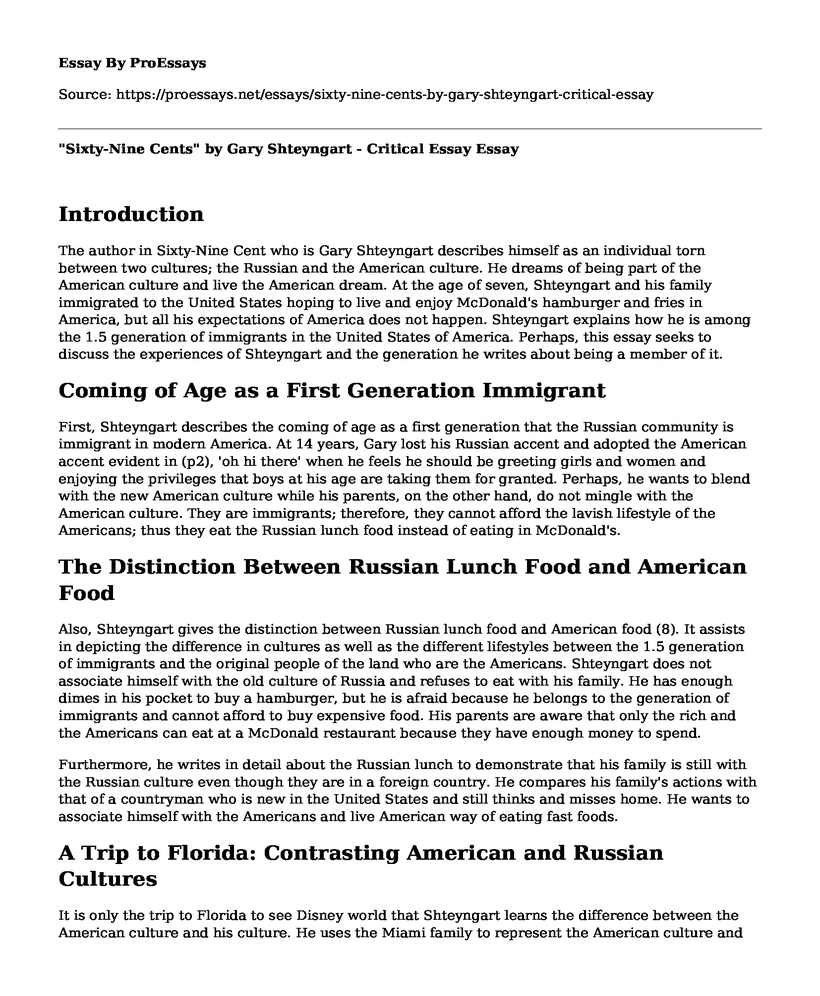Introduction
The author in Sixty-Nine Cent who is Gary Shteyngart describes himself as an individual torn between two cultures; the Russian and the American culture. He dreams of being part of the American culture and live the American dream. At the age of seven, Shteyngart and his family immigrated to the United States hoping to live and enjoy McDonald's hamburger and fries in America, but all his expectations of America does not happen. Shteyngart explains how he is among the 1.5 generation of immigrants in the United States of America. Perhaps, this essay seeks to discuss the experiences of Shteyngart and the generation he writes about being a member of it.
Coming of Age as a First Generation Immigrant
First, Shteyngart describes the coming of age as a first generation that the Russian community is immigrant in modern America. At 14 years, Gary lost his Russian accent and adopted the American accent evident in (p2), 'oh hi there' when he feels he should be greeting girls and women and enjoying the privileges that boys at his age are taking them for granted. Perhaps, he wants to blend with the new American culture while his parents, on the other hand, do not mingle with the American culture. They are immigrants; therefore, they cannot afford the lavish lifestyle of the Americans; thus they eat the Russian lunch food instead of eating in McDonald's.
The Distinction Between Russian Lunch Food and American Food
Also, Shteyngart gives the distinction between Russian lunch food and American food (8). It assists in depicting the difference in cultures as well as the different lifestyles between the 1.5 generation of immigrants and the original people of the land who are the Americans. Shteyngart does not associate himself with the old culture of Russia and refuses to eat with his family. He has enough dimes in his pocket to buy a hamburger, but he is afraid because he belongs to the generation of immigrants and cannot afford to buy expensive food. His parents are aware that only the rich and the Americans can eat at a McDonald restaurant because they have enough money to spend.
Furthermore, he writes in detail about the Russian lunch to demonstrate that his family is still with the Russian culture even though they are in a foreign country. He compares his family's actions with that of a countryman who is new in the United States and still thinks and misses home. He wants to associate himself with the Americans and live American way of eating fast foods.
A Trip to Florida: Contrasting American and Russian Cultures
It is only the trip to Florida to see Disney world that Shteyngart learns the difference between the American culture and his culture. He uses the Miami family to represent the American culture and compares it with his family. The Miami family is a modern family talk, act and eats freely, they eat whatever they want, unlike his family where they behave like countrymen who are new in America yet they have stayed for a while. In this trip, Shteyngart wanted to change and be like the Americans; he wants to live the American dream which the possibility is close to none. His family, on the other hand, remain conservative; hence he could only eat Russian food and not sixty-nine cents McDonald's hamburger and cola as he dreams. Shteyngart parents can remember that they once had a trip to Disney land and enjoyed the trip, but their son behaved weirdly.
Shteyngart writes on, "Back at the motel, the Star Trek reruns looped endlessly on Channel 73 or 31 or some other prime number, the washed-out Technicolor planets more familiar to me than our own" (p.42). Throughout the essay, as a member of the 1.5 immigrant generation, Shteyngart is feeling out of place while in the United States of America. He does not feel the belongingness because they do things very different from the Americans, first, their accent is different, culture is different, and restaurants and foods are different. He feels more of an outsider and uncomfortable. However, he feels comfortable and a sense of belongingness in a fictional world in Miami.
Additionally, they do not receive equal treatment as Americans. They rely on free American offers as Shteyngart states "...my parents, getting up to use free McDonald's napkins and straws while American motorists with their noisy towheaded children bought themselves the happiest of meals" (18). Shteyngart does not want to associate himself with the Old Russian culture that seems very far but near.
Conclusion
In conclusion, the experiences of Shteyngart as an immigrant in America mirrors any international student or immigrant to America who presumes he/she will have much money with plenty of fun, only for them to stick on their old cultures because that is what they can afford. They cannot compare themselves with the Americans despite having the desire to ape their lavish lifestyle, language as well as food. Having a state that comprises immigrants from all over the world, the state must be considerate and be ready to accept others despite different cultures and races.
Work Cited
Shteyngart, Gary. "Sixty-Nine Cents." NEW YORKER-NEW YORKER MAGAZINE INCORPORATED- 2007 (2007): 70
Cite this page
"Sixty-Nine Cents" by Gary Shteyngart - Critical Essay. (2022, Nov 24). Retrieved from https://proessays.net/essays/sixty-nine-cents-by-gary-shteyngart-critical-essay
If you are the original author of this essay and no longer wish to have it published on the ProEssays website, please click below to request its removal:
- The Ballad of The White Horse by G.K. Chesterton Essay
- The Role of Satan in the Inferno - Paper Example
- The Sociological Criticism of the Book The Kite Runner
- Analysis of Internal Conflict in "How It Feels to Be Colored Me" by Zora Neale Hurston
- Assignment Example on Death of a Salesman by Arthur Miller
- Essay Sample on Aime Cesaire's A Tempest: Early Adaptation of Shakespeare's Work
- Essay Example on Hamlet and Oedipus: Literary Classics Relevant Today







